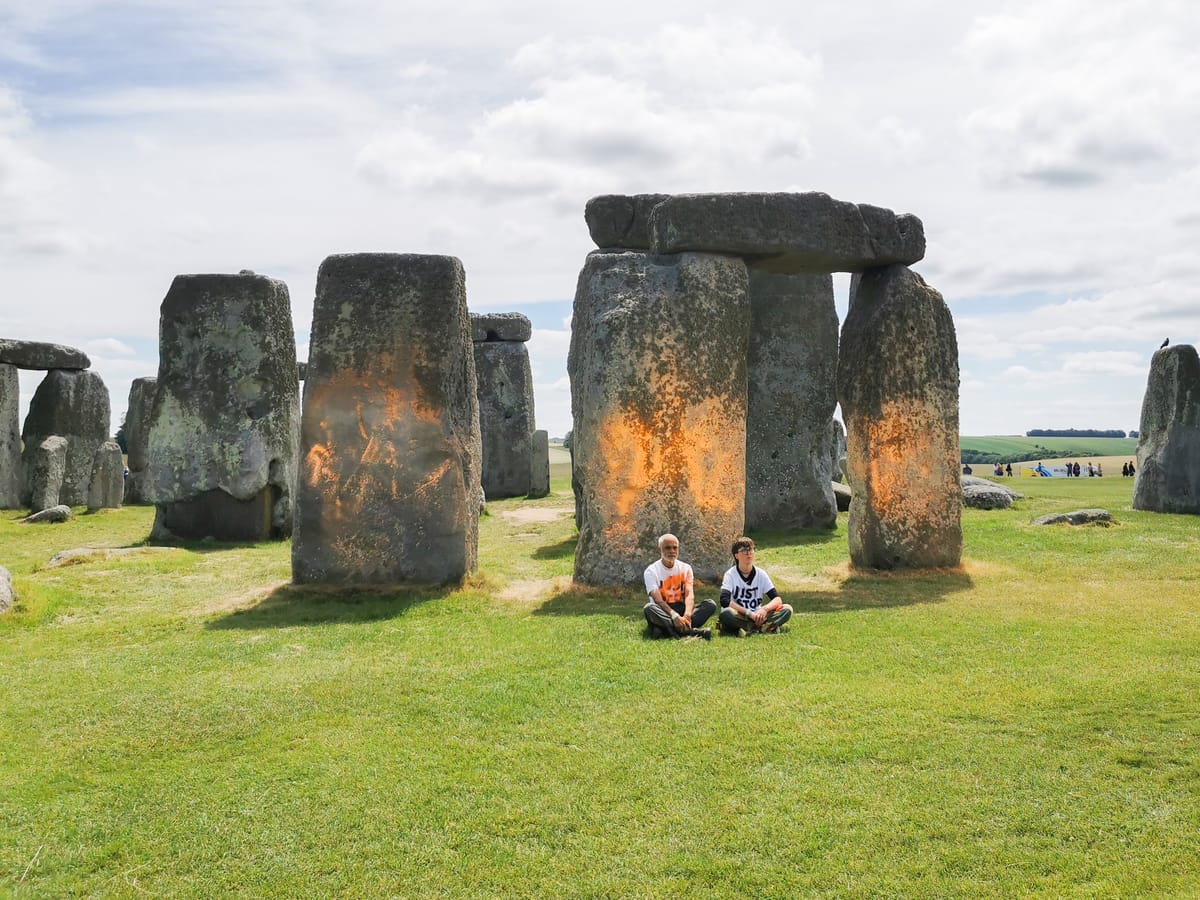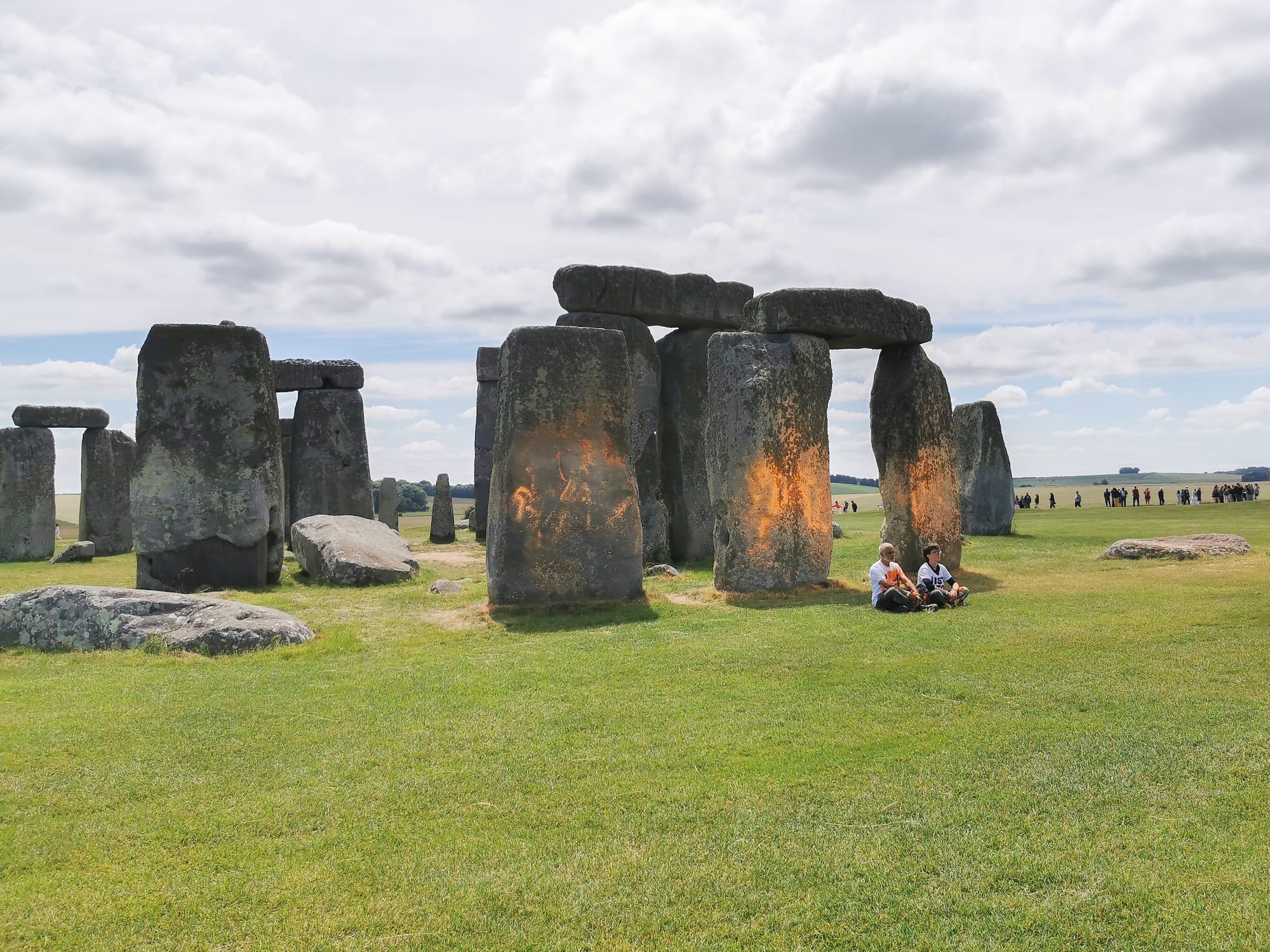Climate Protesters Douse Stonehenge in Orange Powder
Two Just Stop Oil activists were arrested after spraying the structure with what they say is washable orange cornflour ahead of the summer solstice.

Two members of the Just Stop Oil climate advocacy group were arrested on Wednesday, June 19 after dousing parts of the prehistoric Stonehenge monument near the British city of Salisbury in an orange powder.
One of the activists, 73-year-old Birmingham resident Rajan Naidu, explained in a statement that the pigment used in the action is made of orange cornflour that will "soon wash away with the rain, but the urgent need for effective government action to mitigate the catastrophic consequences of the climate and ecological crisis will not."
Calling on the government of the United Kingdom to commit to ending the extraction and burning of fossil fuels by 2030, the protesters took to the megalithic structure around noon, ahead of the summer solstice to be celebrated tomorrow, June 20.
“Stonehenge at solstice is all about celebrating the natural world — but look at the state it’s in!" said 21-year-old Oxford University student Niamh Lynch, the second activists arrested, in the group's press release.
"We all have a right to live a life free from suffering, but continued burning of oil, coal and gas is leading to death and suffering on an unparalleled scale," Lynch said.
A spokesperson for English Heritage, the nonprofit in charge of Stonehenge, told Hyperallergic in a June 20 statement that while they were able to remove the orange powder and there appears to be no visible damage, "the very act of removing the powder can have a harmful impact by eroding the already fragile stone." “We moved quickly due to the risk that the powder would harm the important and rare lichens growing on the stones and that if the powder came into contact with water, it would leave difficult-to-remove streaks,” said Nick Merriman, chief executive of English Heritage.
“Stonehenge is a unique place, one that has special meaning to many of us,” Merriman said. “Surely vandalising a landmark that celebrates the changing seasons, the importance of community, and sheer human ingenuity completely contradicts the protestors’ own principles."

A UNESCO World Heritage Site, the circular monument at Stonehenge is believed to date from the late Neolithic period, approximately 2500 BCE. Though experts are not sure of its exact purpose, the sun rises over one of the stones on the summer solstice, the longest day of the year, suggesting that it may have been used to track the sun's movements and had spiritual significance.
For months, cultural heritage activists in the UK have been actively opposing the construction of a two-mile tunnel that they claim would be dangerously close to the monument, damage the surrounding landscape, and threaten Stonehenge’s World Heritage status. English Heritage supports the project, which it says will ease congestion on the A303 road and "allow people to better appreciate, enjoy and understand Stonehenge, without the experience being ruined by traffic."
Stonehenge remains open to the public after Just Stop Oil's action, and the summer solstice celebration is slated to move forward as planned.

Last week, over 400 climate scientists in the UK released an open letter urging party leaders to commit to a more ambitious program to cut greenhouse gas emissions in advance of the July 4 general elections.
“The UK’s government in waiting has committed to enacting Just Stop Oil’s original demand of ‘no new oil and gas.’ However, we all know this is not enough," says the group's press statement, referring to the left-leaning Labour Party that many predict will end the conservative Tories's longtime mandate.
Just Stop Oil wants the incoming British government to work with other nations on a legally binding Fossil Fuel Non-Proliferation Treaty and support other countries in making a transition to clean energy.
"Continuing to burn coal, oil and gas will result in the death of millions," the press release reads. "We have to come together to defend humanity or we risk everything."
Editor’s note 6/19/24 10pm EST: This article has been updated with a comment from English Heritage.





